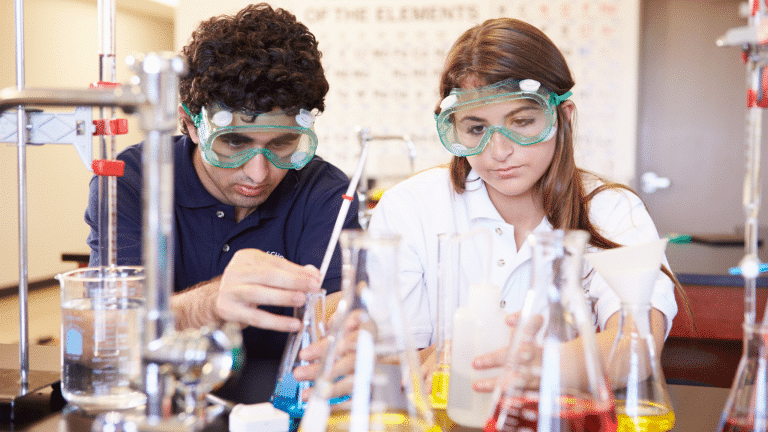As a parent, watching your teenager navigate the choppy waters of high school science classes can feel both exciting and overwhelming. Science isn’t just about memorizing formulas or dissecting frogs—it’s the gateway to incredible future careers, from engineering to environmental conservation, and yes, even medicine.
I remember when my own niece struggled with biology in her sophomore year; she thought it was all rote learning until we tied it to real-world applications like how vaccines work during a pandemic. That shift made all the difference. If your teen is eyeing fields that demand a solid science foundation, like pursuing a career in healthcare, these strategies can help them not only survive but thrive. And who knows? Mastering these classes now could set them up for success in med school admissions down the line, especially if they get involved in a high school research program to deepen their hands-on experience.
In this article, I’ll share five practical strategies drawn from my experiences chatting with educators, parents, and even a few ambitious teens. Each one includes actionable tips, real-life examples, and a dash of motivation to keep things moving forward. Let’s dive in!
Strategy 1: Create a Dedicated Study Space and Routine
The foundation of excelling in any subject starts with the environment. A cluttered desk or studying amid distractions like social media notifications can derail even the brightest minds. Encourage your teen to set up a science-specific study zone—think a quiet corner with good lighting, essential supplies like notebooks, highlighters, and maybe a whiteboard for jotting down equations.
- Why it works: Consistency builds habits. Research from educational psychologists shows that routine study times improve retention by up to 20%. For science, where concepts build on each other (like understanding atoms before tackling chemistry reactions), this is crucial.
- How to implement: Start small. Suggest studying science for 45 minutes daily right after school, with short breaks using the Pomodoro technique. Add fun elements, like posters of famous scientists or a plant to observe growth for biology ties.
- Real-life example: One parent I know turned their garage into a mini-lab for their son, who was passionate about physics. He ended up acing his AP exams and is now exploring engineering paths. If your teen’s interests lean toward medicine, this routine can mimic the discipline needed for med school admissions prep.
- Motivation boost: Remind them, “This isn’t just homework; it’s building the stamina for those long nights in a future lab coat!”
Strategy 2: Connect Classroom Concepts to Real-World Applications
Science can feel abstract and dry if it’s just textbook theory. The magic happens when teens see how it applies to everyday life or current events. For instance, discussing climate change in earth science class? Link it to local weather patterns or global news. Or, encourage participation in a high school research program where they can apply biology lessons to actual experiments on ecosystems.
- Why it works: Relevance sparks curiosity. Studies from the National Science Foundation indicate that students who connect lessons to real life are 30% more engaged and retain information longer.
- How to implement: Watch documentaries together, like ones on Netflix about space exploration for physics, or visit a local museum. Encourage projects, such as building a simple circuit to understand electricity, or tracking nutrition for a biology unit on human anatomy.
- Real-life example: My friend’s daughter was floundering in chemistry until they baked cookies at home, explaining the reactions between ingredients. That hands-on approach turned her grades around and ignited an interest in pharmacology—a key area for aspiring doctors.
- Motivation boost: Ask your teen, “How might this help solve real problems, like developing new treatments in medicine?” If they’re serious about healthcare, a medical school admissions consultant could help map how these connections strengthen their future applications.
Strategy 3: Encourage Active Learning Through Quizzing and Teaching Others
Passive reading won’t cut it in science; active engagement is key. Have your teen quiz themselves or explain concepts to you or a sibling—it’s a proven way to solidify understanding.
- Why it works: Teaching reinforces knowledge. Cognitive science research highlights that explaining ideas aloud improves comprehension by identifying gaps early.
- How to implement: Use flashcards for terms like mitosis or Newton’s laws, or apps like Quizlet for interactive reviews. Role-play: Pretend you’re the student, and let them “teach” a lesson on ecosystems or genetics.
- Real-life example: I once helped a teen prep for a test by having him teach me about DNA replication using household items like string for strands. Not only did he ace the exam, but it built his confidence for group projects, which are vital in collaborative fields like medical research.
- Motivation boost: Frame it as, “You’re not just learning—you’re becoming an expert who could one day lead a team in a hospital or lab.” For those dreaming big, resources from experts in med school admissions can offer tailored strategies to highlight these skills.
Strategy 4: Incorporate Technology and Resources for Deeper Understanding
In today’s digital age, why stick to old-school methods? Leverage online tools to make science interactive and fun, turning potential stumbling blocks into strengths.
- Why it works: Visual aids and simulations cater to different learning styles. According to EdTech reviews, students using digital resources score higher on standardized tests by engaging multiple senses.
- How to implement: Recommend free platforms like Khan Academy for video tutorials on tough topics, or PhET simulations for virtual experiments (e.g., mixing chemicals without the mess). Track progress with apps that gamify learning, rewarding streaks in subjects like physics or environmental science.
- Real-life example: A teen I mentored used YouTube channels to visualize quantum mechanics, which seemed impossible from the textbook alone. This not only boosted her grades but also fueled her passion for neuroscience, a hot field in medicine.
- Motivation boost: Tell them, “Tech isn’t a distraction—it’s your secret weapon for mastering complex ideas that could lead to breakthroughs in healthcare.”
Strategy 5: Foster a Growth Mindset and Seek External Support When Needed
Science classes can be challenging, leading to frustration. Instill a growth mindset: Emphasize that struggles are part of learning, not a sign of failure. This is especially true when teens step into advanced opportunities like a high school research program, where trial and error become daily lessons.
- Why it works: Psychologist Carol Dweck’s work shows that viewing abilities as developable leads to greater resilience and achievement.
- How to implement: Celebrate efforts over outcomes, like praising persistence on a tough lab report. If needed, arrange tutoring or join science clubs. For career-oriented teens, connect with mentors who can provide insights into advanced paths.
- Real-life example: When my neighbor’s son hit a wall in advanced biology, they hired a tutor who focused on mindset shifts. He went from C’s to A’s and is now volunteering at a clinic, building his resume for medical pursuits—plus, he’s eyeing a high school research program next summer to dive deeper.
- Motivation boost: Encourage with, “Every scientist faced setbacks; it’s how you bounce back that counts.” And if med school admissions are on the horizon, partnering with a seasoned medical school admissions consultant can turn those science strengths into a standout application.
Helping your teen excel in science isn’t about pushing them to perfection—it’s about nurturing curiosity and skills that last a lifetime. Whether they’re aiming for a lab, a tech startup, or the medical field, these strategies lay a strong groundwork, and adding experiences like a high school research program can make their profile even more compelling.
There you have it—a roadmap to science success. What’s one strategy you’ll try first? Share in the comments; I’d love to hear your stories!










